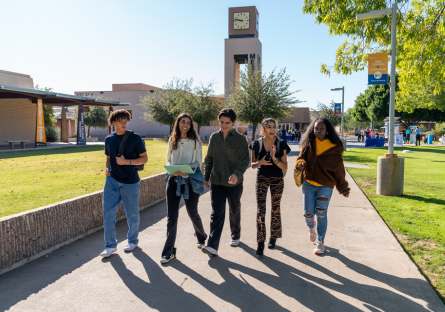
As the Fall 2024 semester gets underway, enrollment at the 10 Maricopa Community Colleges is expected to exceed 100,000 students, including more than 40,000 new and returning students who are the first in their families to attend college.
"We are incredibly excited to kick off a new academic year," said Dr. Steven R. Gonzales, Chancellor of Maricopa Community Colleges. "These enrollment numbers represent the critical role our system plays as the most accessible higher education provider in the Valley.”
Producing the second-largest number of college graduates each year in Arizona, Maricopa Community Colleges has experienced nine consecutive semesters of enrollment growth and is on track to be the largest community college system in the nation this year.
Expanding Access Through Bachelor's Degrees
In the fall of 2023, Maricopa Community Colleges rolled out its first baccalaureate degree programs. Now, only one year later, over 4,100 students are pursuing bachelor's degrees with 60% being first-generation college students. At just $97 per credit hour for lower-division courses and $145.50 for upper-division courses, the baccalaureate programs save students upwards of $40,000—allowing students to complete a four-year degree at an equivalent cost of one year of learning at comparable in-state universities. Last spring, Maricopa Community Colleges made history by honoring its first baccalaureate recipients.
Fueling Arizona's Workforce
In addition to bachelor's degrees, Maricopa Community Colleges has expanded its fall semester offerings with new Fast Track Training programs, including Microcredential Pathways. These pathways provide a modern, flexible, and stackable education model, allowing for shorter, more focused areas of study that can enhance a student's job prospects and be applied toward an associate or bachelor's degree. This flexibility offers students targeted, bite-sized learning opportunities that cater to diverse learning needs—whether that means transitioning into a new career, advancing in a current role, or seeking specific skills.
Powering Our Communities
Of the anticipated 100,000 students, over 87% are Maricopa County residents. According to a recent economic impact study, one out of every 28 jobs in Maricopa County is supported by the activities of the colleges and their students.
"Our students come from our local communities across the state. After graduation, most stay in Arizona, becoming future leaders and driving our economy forward," added Dr. Gonzales. "Our graduates are essential to the health, growth, and success of not only our local communities, but the growing region as well.”
Tackling the Nursing Shortage
After graduating nearly 2,000 nurses this past year, Maricopa Community Colleges has added the Registered Nurse to Bachelor of Science in Nursing (RN-BSN) degree program to its lineup of bachelor's degree programs for the fall semester. Across its 10 colleges, the system is on pace to educate nearly one-third of Arizona's nurses, producing the highest number in the state.
Opportunity For Everyone
As Maricopa Community Colleges continues to expand its programs, the 10 colleges remain steadfast in their commitment to people over profits, offering over 600 certificate and degree programs, including bachelor's degrees, ensuring access to affordable, high-quality postsecondary education that is within reach for everyone.
To learn more, visit maricopa.edu.